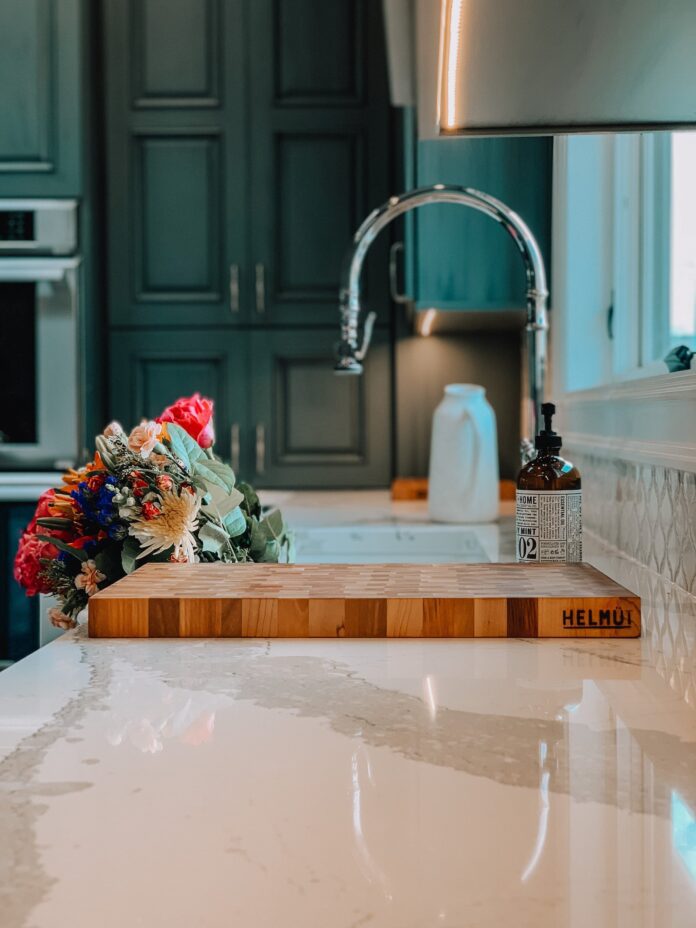Tips From The Experts
So, you’ve decided that it is time to makeover your kitchen and have decided that quartz is the way to go relating to countertops. Great!
Quartz is a very popular stone for kitchen countertops, partly due to its durability, low maintenance, and aesthetic appeal. After all, as quartz comes in such a wide range of colours, it is easy to install a quartz countertop overlay that looks like marble or another higher-end stone. Don’t let that fool you, though! Quartz is far from a lower-quality material to decorate with, and even in its natural form, it can add significant value to your home.
Of course, quartz is highly resistant to scratches, stains, and heat, but proper care is still necessary to keep your quartz surface looking its best. Therefore, if you have opted to have a quartz countertop fitted, you may be curious as to how you can maintain it. Well, read on to find out!
Clean Up Spills Immediately
One of the core benefits of quartz worktops is that they are non-porous, which makes them highly resistant to stains. However, cleaning up spills as soon as possible is still important to avoid any potential damage to the surface. Indeed, much like most stone surfaces, if spills from acidic foods like orange juice or soda go uncleaned, it can cause a hole in the sheen of the quartz, creating an uneven look.
Therefore, as soon as something is spilt, you should use a soft cloth or sponge and a mild cleaner to wipe up any spills.
Use A Cutting Board
Although quartz is highly scratch-resistant, it is still a good idea to use a cutting board when preparing food to avoid any potential damage to the surface. Most people who have a quartz countertop in their kitchen will usually invest in accessories that complement it, such as wooden or even quartz cutting boards. This will keep the surface of the quartz scratch-free and not need repair.
Avoid Exposing Quartz To Extreme Heat
Quartz is highly resistant to heat, but it is still important to avoid placing hot pots or pans directly on the surface, especially if they have been used for frying a batch of pancakes, for example. Instead, aim to use trivets or hot pads to protect the surface from direct heat exposure. While quartz can withstand temperatures up to 149 degrees-celsius, sudden temperature changes, such as placing a cold pot on a hot surface, can cause thermal shock and lead to cracks or damage.
Remember, this can happen even if the surface has been sealed, so rather than reduce the value of the worktop, you should seek to protect it.
Use A Gentle Cleaner
As mentioned before, when it comes to cleaning a quartz countertop, it is best to be gentle, if only for the sake of appearances. When cleaning your quartz surface, use a gentle cleaner and avoid harsh chemicals or abrasive cleaners, such as wire wool. You should also avoid using products that contain bleach, ammonia, or acid, as they can damage the surface. Instead, use a mild soap or detergent and warm water to clean the work surface, and avoid using scrub brushes or abrasive sponges, as these can cause scratches.
Regularly Clean The Surface
While quartz is low maintenance, regular cleaning is still necessary to keep it looking brand new and stylish. Each day, aim to wipe down the surface top with a soft cloth or sponge and warm water, and use a mild detergent for more stubborn stains. Avoid leaving any food or liquids on the surface for extended periods, as they can leave behind stains or discolouration.
FAQs About Quartz
If you are looking to get a quartz countertop or overlay fitted or already have one and have concerns that you have not been caring for it properly, then you will likely have some questions. Therefore, to help you with maintenance, here are some of the most commonly asked questions about quartz countertops.
How Do I Remove Stains From Quartz Countertops?
Removing stubborn grease or oil stains from your quartz countertops can be tricky, but it is possible with the right technique.
First, using a plastic scraper or a spatula, gently scrape off any excess grease or oil from the surface of the countertop. Mix together baking soda and water to create a thick paste. The paste should be thick enough to spread easily but not so thin that it runs off the surface. Lightly apply the baking soda paste to the grease or oil stain using a soft cloth or sponge. Spread the paste over the entire stain, making sure to cover it completely.
Allow the premixed paste to sit on the stain for 15-20 minutes. This will give the paste time to absorb the grease or oil.
Then, using a soft-bristled brush or a non-abrasive sponge, gently scrub the stain in a circular motion. Be sure to apply gentle pressure to avoid scratching the surface.
Rinse the countertop thoroughly with lukewarm water to remove any remaining baking soda paste. Use a soft cloth or towel to dry the surface, and if the stain persists, repeat the process as necessary.
How Do I Repair A Chip Or Crack In My Quartz Countertop?
If you need to repair a chip or crack in your quartz countertop, you can use a two-part epoxy resin. First, clean the damaged area with a mild cleaner and dry it thoroughly. Mix the two-part epoxy according to the instructions and apply it to the cracked or chipped area using a putty knife. Smooth the surface with a razor blade or scraper, and let the epoxy dry completely. Once dry, sand the repaired area with fine-grit sandpaper until it is smooth and leveled with the surrounding surface. Finally, clean the area with a mild cleaner and water to remove any dust or debris.
If the damage is substantial, call a professional to repair it.
How Often Do I Need To Seal My Quartz Countertops?
Quartz countertops do not require sealing because they are non-porous. Unlike natural stone surfaces, they do not absorb liquids and are resistant to stains. Therefore, sealing quartz countertops is not necessary. Clean them regularly with a mild cleaner and water to maintain their appearance.
However, if you want them to have a more reflective appearance, you can seal them with a varnish, but it is not necessary to protect the stone.
Can I Use Vinegar On A Quartz Countertop?
While vinegar is generally safe to use on quartz countertops, it is important to dilute it with water before using it as a cleaning solution. Straight vinegar can be too acidic and may damage the surface of the quartz over time. A safe cleaning solution for quartz countertops is a mixture of warm water and mild dish soap or a specialized quartz cleaner. Avoid using abrasive scrubbers or harsh chemicals, as they can scratch or damage the surface of the countertop.
How Do I Prevent My Quartz Countertops From Getting Scratched?
To prevent scratches on your quartz countertops, it’s important to use cutting boards, trivets, and coasters. Avoid cutting or placing hot items directly on the countertop’s surface, as this can cause scratches or thermal shock. Also, be careful when using sharp objects near the surface of the countertop, such as knives or scissors, as they can easily scratch the surface. Use a soft cloth or sponge to wipe down the surface, and avoid using abrasive cleaning products or scrubbers, such as wire wool or brushes. With proper care and maintenance, you can keep your quartz countertops looking like new for years to come, keeping your kitchen looking great and adding to the value of your home. Perfect!
Help keep news FREE for our readers
Supporting your local community newspaper/online news outlet is crucial now more than ever. If you believe in independent journalism, then consider making a valuable contribution by making a one-time or monthly donation. We operate in rural areas where providing unbiased news can be challenging. Read More About Supporting The West Wales Chronicle


























